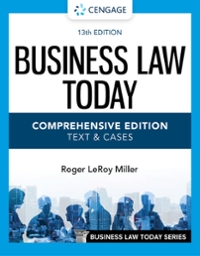RPM Pizza, Inc., issued a check for $96,000 to Systems Marketing for an advertising campaign. A few
Question:
RPM Pizza, Inc., issued a check for $96,000 to Systems Marketing for an advertising campaign. A few days later, RPM decided not to go through with the deal and placed a written stop-payment order on the check. RPM and Systems had no further contact for many months. Three weeks after the stop-payment order expired, however, Toby Rierson, an employee at Systems, cashed the check. Bank One Cambridge, RPM’s bank, paid the check with funds from RPM’s account. Because the check was more than six months old, it was stale. Thus, according to standard banking procedures as well as Bank One’s own policies, the signature on the check should have been specially verified, but it was not. RPM filed a suit in a federal district court against Bank One to recover the amount of the check. Using the information presented in the chapter, answer the following questions.
1. How long is a written stop-payment order effective? What else could RPM have done to prevent this check from being cashed?
2. What would have happened if RPM had not had a legitimate reason for stopping payment on the check?
3. What are a bank’s obligations with respect to stale checks?
4. Would a court be likely to hold the bank liable for the amount of the check because it failed to verify the signature on the check? Why or why not?
Step by Step Answer:






